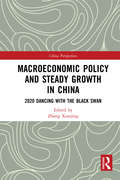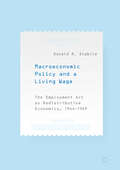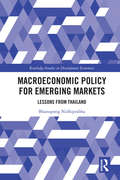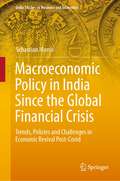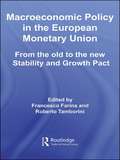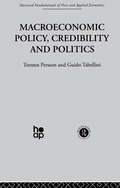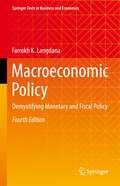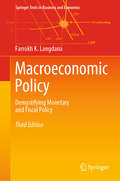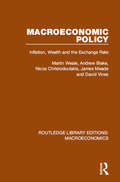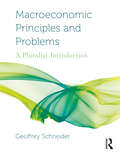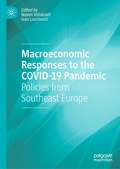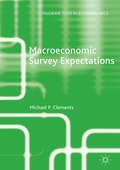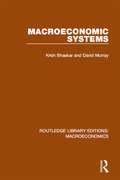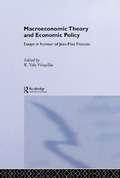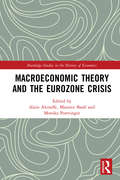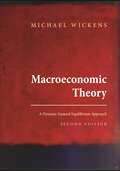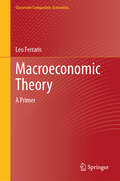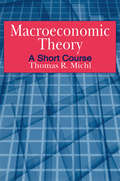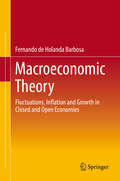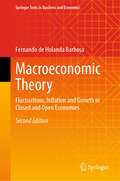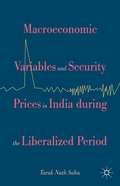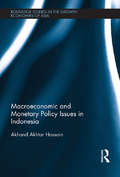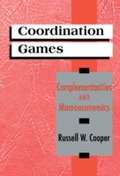- Table View
- List View
Macroeconomic Policy and Poverty Reduction
by Brian Ames Ward Brown Shanta Devarajan Alejandro IzquierdoA report from the International Monetary Fund.
Macroeconomic Policy and Steady Growth in China: 2020 Dancing with Black Swan (China Perspectives)
by Zhang XiaojingSince the appearance of macroeconomics in the 1940s, economists have created many theoretical frameworks to explain the origin and mechanism of economic fluctuations. However, few of these have managed to gain explanatory power over reality; nor can they solve real-life problems. This book proposes a new macroeconomic paradigm that makes breakthroughs in these areas. Based on a balance sheet approach and macro-financial linkage analysis, this book carries out a comprehensive analysis of the trends within China’s macroeconomy in 2020. The author argues that the COVID-19 pandemic created a great degree of uncertainty—therefore, supply-side structural reform and improved total factor productivity have been promoted to ensure a policy of steady growth. Given the declining economic growth rate in percentage terms, China has needed to adapt to a moderate increase in the leverage ratio while applying more effective fiscal policies to achieve a dynamic balance between stable growth and risk prevention. Scholars and students of economics and finance, especially Chinese economics, will find this book a useful reference.
Macroeconomic Policy and a Living Wage: The Employment Act As Redistributive Economics, 1944-1969
by Donald R. StabileThis book offers a new interpretation of the Employment Act of 1946. It argues that in addition to Keynesian economics, the idea of a living wage was also part of the background leading up to the Employment Act. The Act mandated that the president prepare an Economic Report on the state of the economy and how to improve it, and the idea of a living wage was an essential issue in those Economic Reports for over two decades. The author argues that macroeconomic policy in the USA consisted of a dual approach of using a living wage to increase consumption with higher wages, and fiscal policy to create jobs and higher levels of consumption, therefore forming a hybrid system of redistributive economics. An important read for scholars of economic history, this book explores Roosevelt’s role in the debates over the Employment Act in the 1940s, and underlines how Truman’s Fair Deal, Kennedy’s New Frontier and Johnson’s Great Society all had the ultimate goal of a living wage, despite their variations of its definition and name.
Macroeconomic Policy for Emerging Markets: Lessons from Thailand (Routledge Studies in Development Economics)
by Bhanupong NidhiprabhaMacroeconomic policies matter for sustainable long-term growth. With global fluctuations, deviation from a stable growth path can be minimized by countercyclical macro policies, if properly implemented. This book examines Thailand’s 55 years of experience in macroeconomic management and provides valuable lessons for other emerging economies at various stages of development on what could have been done to avoid economic instability. It also examines how short-term complications can develop into perennial problems obstructing the process of economic development. The book provides an alternative approach to the study of economic growth through the inclusion of both economic history and institutional context, appealing to academics and economists who focus on economic growth, economic development, international macroeconomics, public policy study, business cycles, and the open-market economy.
Macroeconomic Policy in India Since the Global Financial Crisis: Trends, Policies and Challenges in Economic Revival Post-Covid (India Studies in Business and Economics)
by Sebastian MorrisThis book discusses the Indian economic crisis and brings out what went wrong and the correction necessary for getting the economy back to high growth trajectory, leading to economic transformation. To do so, the book covers trends in performance of Indian economy since the Global Financial Crisis to the COVID-19 effect, bringing out factors that have determined the same. The book questions the approach to macroeconomic policy of both the RBI and the government and brings out what it takes for macroeconomic policy to be supportive of high growth. It contains revealing contrasts with East Asia and China, although India has the same potential to grow with an expansion of manufacturing. Overall, it argues that macroeconomic policies (as much as structural, industrial, and trade policies) have been deficient and even good initiatives on the industrial policy and trade flounder for the lack of a strategic approach to macroeconomics. The book highlights the special opportunities present in an emerging economy with vast under and utilised labour and the macroeconomic policy initiatives that can take advantage of this key feature. It covers the macroeconomic data on growth using multiple indicators, then the external shocks and the internal policy measures/responses; besides, GVA/GDP, credit, exports, external transactions, interest and policy rates, yields, exchange rates, money, capital flows, indices of industrial sector, price indices and inflation, government expenditures, tax rates, fiscal deficits, market uncertainty measures to present a holistic picture of the economy and the shocks and policy actions that have followed. The book uses an innovative method of presentation and the consistency of the trends/stances of both monetary and fiscal policy using these large number of variables. It discusses the debate on overestimation of GDP/GVA growth estimates over the years from 2011-12 to about 2016-17 comprehensively. There is special coverage of GST with a comparison with China. Coverage also includes performance since the COVID-19 crisis again using a large number of indicators and an explanation for the same in terms of the limitations of the government’s initiatives to counteract. The book is a quick and ready reference of what has happened in macroeconomic terms to those interested in the relevant facts. It is of interest to international economists, policy analysts, and investors whose need to understand that the Indian economy in macroeconomic terms and in terms of the stances and penchant of the government and the RBI is of value.
Macroeconomic Policy in the European Monetary Union: From the Old to the New Stability and Growth Pact (Routledge Studies In The European Economy Ser.)
by Francesco Farina Roberto TamboriniProviding readers with a multi-faceted assessment of the implementation of fiscal policies in the euro zone and their macroeconomic effects five years after the inception of the euro, this book, international in perspective and scope, is the first reliable reference source for discussions in this area for both academics and policy makers.Comprising
Macroeconomic Policy, Credibility and Politics
by T. Persson G. TabelliniUses a game theoretic approach to explore which economic policies are 'credible' and 'politically feasible', questions that had eluded traditional macroeconomic approaches.
Macroeconomic Policy: Demystifying Monetary and Fiscal Policy (Springer Texts in Business and Economics)
by Farrokh K. LangdanaThis book is an applications-oriented text designed for individuals who desire a hands-on approach to analyzing the effects of fiscal and monetary policies. Significantly updated for the fourth edition, the text provides an understanding of the global economy in the wake of the COVID crisis, discussing topics such as pandemic related supply and demand-side shocks, the role of Modern Monetary Theory (MMT) in financing COVID rescue plans, the effect of the US, India, Eurozone and China’s post-COVID economies on emerging and transitioning economies, and the resurgence of inflation. This edition includes deeper coverage on the issue of budget deficit sustainability and on trade wars, especially in a global context, and revisits the life cycles of speculative asset price (SAP) bubbles, especially in the housing markets and in SPACs. The fourth edition contains several brand-new cases and media articles that are carefully positioned to relate explicitly to theory, and to look ahead to and preempt global macro situations and polices in the years to come. MBA students and Executive MBA students who appreciate the importance of monetary and fiscal analysis will find this text to be right on target. Financial analysts and individual investors who need to strip away economic myths and jargon and systematically examine and understand the effects of macro policies on variables such as inflation, output, employment and interest rates, will also find the book extremely useful.
Macroeconomic Policy: Demystifying Monetary and Fiscal Policy (Springer Texts in Business and Economics)
by Farrokh K. LangdanaThis book is an applications-oriented text designed for individuals who desire a hands-on approach to analyzing the effects of fiscal and monetary policies. Significantly updated to provide an understanding of the post-financial crisis economy, the third edition covers the subprime crisis in detail, discussing monetary policies enacted in its wake, such as quantitative easing, tapering, carry trades, CMOs, and monetization. Even more globally oriented than previous editions, this volume links the Great Recession and US Monetary Policy to global hot capital flows and currency pegs. This edition also revisits the Eurozone in significant detail; discussing its history, its macroeconomic design challenges, and its present imperiled state, in the context of global macropolicy. Finally, this volume analyzes the "China syndrome" and explores the effects of slower trend growth in China on the rest of the world. India, with its different—almost supply-side—approach to macropolicy is also studied in detail. The third edition contains several brand-new cases and media articles that are carefully positioned to relate explicitly to theory, and to look ahead to and preempt global macro situations and polices in the years to come. MBA students and Executive MBA students who appreciate the importance of monetary and fiscal analysis will find this text to be right on target. Financial analysts and individual investors who need to strip away economic myths and jargon and systematically examine and understand the effects of macro policies on variables such as inflation, output, employment and interest rates, will also find the book extremely useful.
Macroeconomic Policy: Inflation, Wealth and the Exchange Rate (Routledge Library Editions: Macroeconomics #8)
by David Vines Nicos Christodoulakis Martin Weale Andrew Blake James E MeadeThis analysis of macroeconomic policy, originally published in 1989, argues that key government objectives, such as reduced inflation, decreased unemployment and an adequate level of national saving can be achieved only by employing both monetary and fiscal policies, in conjunction with supply-side policies expressly designed to improve the workings of the labour market. Part 1 is a comparative analysis showing the effects of monetary and fiscal policy on the economy. Real-wage rigidity in the labour market is shown to have important consequences for the working of both types of policy, because it conditions the economy’s response to tax changes. Part 2 presents an econometric model which combines consistent stock-flow accounts with a full range of expectational effects. Part 3 presents an innovative technique for solving rational expectations models with the need for arbitary terminal conditions.
Macroeconomic Principles and Problems: A Pluralist Introduction (Routledge Pluralist Introductions to Economics)
by Geoffrey SchneiderMacroeconomic Principles and Problems: A Pluralist Introduction offers a comprehensive overview of the major topics in modern macroeconomics, from mainstream and heterodox perspectives. This textbook examines the key macroeconomic problems and policy debates facing contemporary society, including economic crises, sustainability, fiscal and monetary policy, government debt, state-led vs. market-led approaches for growth, and unregulated trade vs. protectionism. Written in an engaging style and focused on real-world examples, this textbook brings macroeconomics to life. Multiple examples of how each economic model works, coupled with critical analysis of the assumptions behind them, enable students to develop a sophisticated understanding of the material. Digital supplements are also available for students and instructors. Macroeconomic Principles and Problems offers the most contemporary and complete package for any pluralist macroeconomics principles class.
Macroeconomic Responses to Terms-of-Trade Shocks: A Framework for Policy Analysis for the Argentine Economy
by Pelin BerkmenA report from the International Monetary Fund.
Macroeconomic Responses to the COVID-19 Pandemic: Policies from Southeast Europe
by Neven Vidaković Ivan LovrinovićThis book examines economic policies utilized within Southeast Europe in response to the COVID-19 pandemic. Covering countries both within and outside the European Union, the human and economic cost of the pandemic is calculated using macroeconomic models from a short and longer term perspective. The economic policies used during the pandemic are analyzed, alongside crisis management approaches, to highlight the effectiveness of monetary policy, fiscal policies and potential future economic solutions for the post COVID-19 period. This book aims to provide policy recommendations based on findings from Southeast Europe. It is relevant to researchers and policymakers involved in economic policy and the political economy, as well as anyone interested in the responses to the COVID-19 pandemic.
Macroeconomic Survey Expectations (Palgrave Texts in Econometrics)
by Michael P. ClementsWhy should we be interested in macroeconomic survey expectations? This important book offers an in-depth treatment of this question from a point of view not covered in existing works on time-series econometrics and forecasting. Clements presents the nature of survey data, addresses some of the difficulties posed by the way in which survey expectations are elicited and considers the evaluation of point predictions and probability distributions. He outlines how, from a behavioural perspective, surveys offer insight into how economic agents form their expectations.
Macroeconomic Systems (Routledge Library Editions: Macroeconomics)
by Krish Bhaskar David F. MurrayThis volume, originally published in 1976, creates a basis from which the specialist topics of macroeconomics can be approached. The first section deals exclusively with a simple classical and Keynesian model within a single common framework to facilitate easy comparison. Although simple models, they provide a sound starting point for the more advanced ideas which make up the second part of the book. Recognizing tht one of the crucial purposes of macroeconomics is to provide advice for central government policy makers, the policy implications of the models are discussed.
Macroeconomic Theory and Economic Policy: Essays in Honour of Jean-Paul Fitoussi (Routledge Frontiers Of Political Economy Ser. #Vol. 59)
by K. Vela VelupillaiJean-Paul Fitoussi needs no introduction as one of the world's foremost Macroeconomists of his generation. This celebration of his work includes contributions from Nobel Prize - winning economists Robert W. Clower and Robert Solow as well as Olivier Blanchard and leading economic theorist, Edmond Malinvaud.
Macroeconomic Theory and the Eurozone Crisis (Routledge Studies in the History of Economics)
by Monika Poettinger Alain Alcouffe Maurice BasléThe financial crisis of 2007 required the economics discipline to thoroughly re-evaluate its prevailing theories about economic cycles and economic growth. With a focus on Europe, this volume identifies the latest strands of research on business cycles, monetary theory, the evolution of social policies and public spending, and the institutional context of the European Union. It also considers whether these new ideas could have helped us avoid the crisis, and how they might reshape the current economic paradigm.This book will be of interest to advanced students and researchers in European economics, macroeconomics and economic history.
Macroeconomic Theory: A Dynamic General Equilibrium Approach - Second Edition
by Michael WickensThe definitive graduate textbook on modern macroeconomicsMacroeconomic Theory is the most up-to-date graduate-level macroeconomics textbook available today. This revised second edition emphasizes the general equilibrium character of macroeconomics to explain effects across the whole economy while taking into account recent research in the field. It is the perfect resource for students and researchers seeking coverage of the most current developments in macroeconomics.Michael Wickens lays out the core ideas of modern macroeconomics and its links with finance. He presents the simplest general equilibrium macroeconomic model for a closed economy, and then gradually develops a comprehensive model of the open economy. Every important topic is covered, including growth, business cycles, fiscal policy, taxation and debt finance, current account sustainability, and exchange-rate determination. There is also an up-to-date account of monetary policy through inflation targeting. Wickens addresses the interrelationships between macroeconomics and modern finance and shows how they affect stock, bond, and foreign-exchange markets. In this edition, he also examines issues raised by the most recent financial crisis, and two new chapters explore banks, financial intermediation, and unconventional monetary policy, as well as modern theories of unemployment. There is new material in most other chapters, including macrofinance models and inflation targeting when there are supply shocks. While the mathematics in the book is rigorous, the fundamental concepts presented make the text self-contained and easy to use. Accessible, comprehensive, and wide-ranging, Macroeconomic Theory is the standard book on the subject for students and economists.The most up-to-date graduate macroeconomics textbook available todayGeneral equilibrium macroeconomics and the latest advances covered fully and completelyTwo new chapters investigate banking and monetary policy, and unemploymentAddresses questions raised by the recent financial crisisWeb-based exercises with answersExtensive mathematical appendix for at-a-glance easy referenceThis book has been adopted as a textbook at the following universities:American UniversityBentley CollegeBrandeis UniversityBrigham Young UniversityCalifornia Lutheran UniversityCalifornia State University - SacramentoCardiff UniversityCarleton UniversityColorado CollegeFordham UniversityLondon Metropolitan UniversityNew York UniversityNortheastern UniversityOhio University - Main CampusSan Diego State UniversitySt. Cloud State UniversityState University Of New York - Amherst CampusState University Of New York - Buffalo North CampusTemple University - MainTexas Tech UniversityUniversity of AlbertaUniversity Of Notre DameUniversity Of OttawaUniversity Of PittsburghUniversity Of South Florida - TampaUniversity Of TennesseeUniversity Of Texas At DallasUniversity Of WashingtonUniversity of Western OntarioWesleyan UniversityWestern Nevada Community College
Macroeconomic Theory: A Primer (Classroom Companion: Economics)
by Leo FerrarisThis book offers a comprehensive introduction to modern macroeconomic theory, bridging foundational concepts with contemporary applications. It begins by exploring the core macroeconomic model featuring rational agents and competitive markets—the cornerstone for analyzing business cycles, economic growth, and asset pricing. From there, it transitions to more complex frameworks, including models that incorporate market imperfections and strategic interactions, crucial for understanding liquidity challenges and financial crises. Designed as a primer, this text explains the theoretical foundations of modern macroeconomics in an accessible way, without relying on advanced recursive techniques.
Macroeconomic Theory: A Short Course
by Thomas R. MichlA look at all the key topics in intermediate-level macroeconomic theory with carefully chosen linear versions of the standard models of both the closed and the open economy. It requires no mathematical proficiency beyond high school level algebra, and has been thoroughly tested in the classroom.
Macroeconomic Theory: Fluctuations, Inflation And Growth In Closed And Open Economies
by Fernando de Holanda BarbosaMacroeconomics is the application of economic theory to the study of the economy’s growth, cycle and price-level determination. Macroeconomics takes account of stylized facts observed in the real world and builds theoretical frameworks to explain such facts. Economic growth is a stylized fact of market economies, since England’s nineteenth-century industrial revolution. Until then, poverty was a common good for humanity. Economic growth consists in the persistent, smooth and sustained increase of per-capita income. A market economy shows periods of expanding and contracting economic activity. This phenomenon is the economic cycle. The price of money is the amount of goods bought with one unit of money, in other words, the inverse of the price level. Determination of the price level, or the value of money, is a fascinating subject in a fiat money economy.
Macroeconomic Theory: Fluctuations, Inflation and Growth in Closed and Open Economies (Springer Texts in Business and Economics)
by Fernando de BarbosaMacroeconomics is the application of economic theory to the study of the economy’s growth, cycle and price-level determination. Macroeconomics takes account of stylized facts observed in the real world and builds theoretical frameworks to explain such facts. Economic growth is a stylized fact of market economies, since England’s nineteenth-century industrial revolution. Until then, poverty was a common good for humanity. Economic growth consists in the persistent, smooth and sustained increase of per-capita income. A market economy shows periods of expanding and contracting economic activity. This phenomenon is the economic cycle. The price of money is the amount of goods bought with one unit of money, in other words, the inverse of the price level. Determination of the price level, or the value of money, is a fascinating subject in a fiat money economy. Revised and updated, the second edition introduces a number of new topics, including the New Keynesian IS Curve, Real BusinessCycles, and the Consumption Asset Pricing Model, as well as updated end-of-chapter exercises.
Macroeconomic Variables And Security Prices In India During The Liberalized Period
by Tarak Nath SahuThe liberalization of the Indian economy and consequent strengthening of the relationship between the Indian financial system and the rest of the world has made India more vulnerable to macro issues. This book provides a comprehensive analysis of the dynamic relationship between macroeconomic variables and stock prices in India. A wide range of statistical models are used to estimate and interpret the relationships between Indian stock prices and eleven macroeconomic variables during the liberalized period. While the author finds that the Indian stock market is sensitive to changes in macroeconomic fundamentals in the long run, in the short run only a few macroeconomic variables (such as consumer price index, foreign trade, and exchange rate) affect stock prices. The study also observes that the Indian stock market is approaching informational inefficiency in the long run. Research findings and policy implications discussed here provide insight into other emerging economies as well.
Macroeconomic and Monetary Policy Issues in Indonesia (Routledge Studies in the Growth Economies of Asia)
by Akhand Akhtar HossainFollowing the acquisition of its sovereignty from the Netherlands in 1949, Indonesia experienced serious economic and political problems during the 1950s and 1960s, before entering a three-decade-long period of rapid economic growth. Hard-hit by the financial crisis of the late 1990s, Indonesia undertook a wide range of economic and financial reforms. These reforms served to prepare it well for the 2007-08 global financial crisis, through which Indonesia passed relatively unscathed. Drawing on empirical research, this book presents a comprehensive empirical study on the key macroeconomic relations and monetary policy issues in Indonesia. The book analyses monetary, fiscal and exchange-rate policies, looking at their interactions and impacts on the economy. It demonstrates how important macroeconomic management for monetary and financial stability is to sustained national economic growth and development. Data from the 1970s is compared and contrasted with 1950s data to analyse macroeconomic policies and issues in an historical context. Statistical and econometric techniques are juxtaposed with general empirical results to supplement informative discussion of macroeconomic and monetary developments. This book is a useful contribution to studies on macroeconomics and international development, as well as Southeast Asian studies.
Macroeconomics
by Russell Cooper A. Andrew JohnThis book studies the implications of macroeconomic complementarities for aggregate behavior. The presentation is intended to introduce Ph. D. students into this sub-field of macroeconomics and to serve as a reference for more advanced scholars. The initial sections of the book cover the basic framework of complementarities and provide a discussion of the experimental evidence on the outcome of coordination games. The subsequent sections of the book investigate applications of these ideas for macroeconomics. The topics Professor Cooper explores include: economies with production complementarities, search models, imperfectly competitive product markets, models of timing and delay and the role of government in resolving and creating coordination problems.

